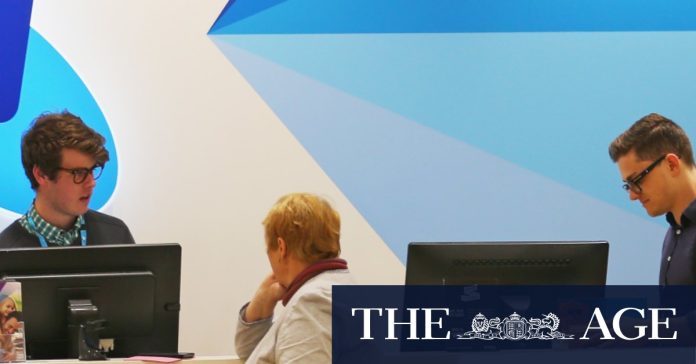[ad_1]
Analysts such as Lee agree that Australia’s telcos have seen subdued returns on their investments in the past five years compared to the serious investments they have pumped into upgrades. They also say that Australian mobile plans are still relatively cheap compared to other telcos globally.

Telstra announced job cuts and price changes on Tuesday.Credit: Bloomberg
“With the high cost of living, consumers are becoming more sensitive to price changes,” Lee told this masthead.
He says Telsyte’s latest research found that subscribers of major telcos are feeling increased pressure, with more than half believing they are paying too much for their mobile services. That compares to just 20 per cent of those purchasing services from a smaller Mobile Virtual Network Operator (MVNO) – a company that does not own a mobile spectrum license but sells mobile services under its own brand name using the network of a licensed mobile operator – such as Aldi, or Boost.
MVNOs often offer cheaper prices than the likes of Telstra or Optus, given they lease wireless capacity at wholesale prices, then resell it to customers under their own brand. They can do so because they do not own or maintain their own infrastructure.
According to Lee, the lower-cost MVNOs are most likely to benefit from any price rises by Telstra, Optus or TPG.
“Price remains the top factor driving churn in mobile services,” he said. Churn is the industry term referring to customers switching service providers.
Vodafone, which is owned by TPG, kicked off its price rises in January, lifting its monthly mobile phone fees by between 6 per cent and 9 per cent, citing the “high costs of doing business.” Customers are now paying an extra $48 each year for their plan than they were a year ago.
Luke Clifton, group executive of Telstra rival Macquarie Telecom, believes Telstra’s announcements this week pave the way for higher prices.
“The writing appears to be on the wall as financial analysts have determined this is the only way that Telstra can get to its FY25 guidance numbers,” he said. “This will mean higher mobile prices for Australians already dealing with a cost-of-living crisis, poorer customer service, and more people out of work due to staff layoffs.”
More information about Optus’ ongoing pricing strategy is expected on Thursday when the company unveils its latest set of financial results.
The most recent data from the competition watchdog shows Telstra remains Australia’s dominant mobile player, with a 44 per cent market share, with Optus commanding 31 per cent and TPG third, with 17 per cent.
Loading
Veteran telco analyst Paul Budde is expecting a “price war” to erupt between traditional fierce rivals Telstra, Optus and TPG, which operates a range of brands including Vodafone and Lebara. Each of the big three will be closely watching each other and reacting accordingly, he says.
“It will be interesting to see. Competition is fierce, and TPG especially would offer better prices if Telstra opts to increase its [prices],” he said. “The companies are basically competing on price. So, if Telstra up its prices it will lose market share. They will have to make a choice.
“And if they all increase their prices the competition and consumer watchdog might have a look at that.”
For its part, the Australian Competition and Consumer Commission said it is closely monitoring the situation to make sure the telcos are meeting their obligations.
“If households are impacted by cost-of-living pressures, we recommend that they seek support from their retailer or shop around for any offers that represent better value for them,” an ACCC spokesman said.
The Business Briefing newsletter delivers major stories, exclusive coverage and expert opinion. Sign up to get it every weekday morning.
[ad_2]
Source link


